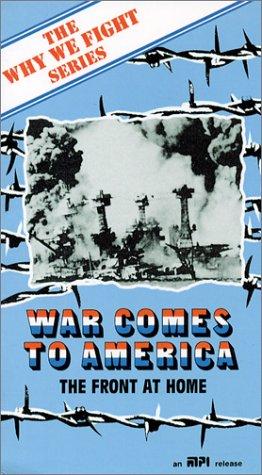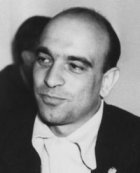
War Comes to America Page #2
- NOT RATED
- Year:
- 1945
- 70 min
- 91 Views
there are in the world.
We demand the highest standards
in sanitation,
...purity of food, medical care.
Our hospitals are marvels
for the world to copy.
We want the best for the average
man, woman and child.
Particularly child. We have
reduced the hazard of being born,
From then on we protect, foster and generally
spoil the majority of our children.
But it doesn't seem to hurt them much.
They go to school,
...all kinds of schools.
To kindergarten,
...public schools, private schools,
trade schools,
...high schools, to 25,000 high schools,
...and to college.
In the last war, 20% of all the men in
the armed forces had been to high school or college.
In this war, 63%.
We're a great two-weeks vacation people.
We hunt and we fish, up north
and down south,
...back east, out west. When the season
opens, we hunt and fish.
We're a sports-loving people.
And we're probably the travel
ingest nation in all history...
...we love to go places.
We have the cars, we have the roads,
we have the scenery.
We don't need passports,
but sometimes we need alibis.
We sleep by the road, we eat by the road.
The foreigner is enchanted and amazed
at what we like to put on our stomach's.
And we're a great joining people,
we join clubs.
Fraternities, unions, federations.
Shove a blank at us, we'll sign up.
Radios, we have on in the living room,
...the dining room,
...the bedroom,
...the bathroom, in our cars,
...in our hands and up our sleeves.
Music. We couldn't be without it.
The Press? Yes, it's the biggest.
But most important,
it's the freest on earth.
Over 12,000 newspapers,
with all shades of opinions.
Books on ever-conceivable subject.
And more than 6000 different magazines.
Not counting the comics.
Churches?
We have every denomination on earth.
60 million of us, regularly attend.
And no one dares tell us,
which one to go to.
We elect our own neighbors to govern us.
We believe in individual enterprise
and opportunities, for men and women alike.
We make mistakes, we see the results.
We correct the mistakes.
We skyrocket into false prosperities,
...and then plummet down into false
needless depressions.
But in spite of everything, we never
lose our faith in the future.
We believe in the future,
we build for the future.
Yes, we build for the future and
the future always catches up with us.
Before we're done building, we've developed
something new, and have to start rebuilding.
That's roughly the kind of people we are.
Boasting, easy-going, sentimental,
but underneath,
...passionately dedicated to the ideals
our forefathers passed on to us.
The liberty and dignity of man.
We've made great material progress, but
Spiritually we're still in the frontier days.
Yet deep down in us, there is a yearning
for peace and good-will toward men.
Somehow we feel, that if men thru their
minds towards the fields of peace,
...as they have towards the fields
of transportation,
...communication or aviation,
...wars would soon be old-fashioned
We hate war. We know that in war,
it is the common man who does the paying.
The suffering, the dying. We bend over
backwards to avoid it.
But let our freedoms be endanger, and we'll
pay and suffer and fight to the last man.
That is the American. That is the way
of living, For which we fight today.
Why?
Is that fight necessary?
Did we want war?
In 1917, before most of you
fighting men were born,
our fathers fought the first World War to make the
world safe for democracies, for the common man.
They fought a good fight and won it.
There was to be no more war in their time,
Faithful to our treaty obligations, we
destroyed much of our naval tonnage.
Our army went on a reducing diet,
until it became little more than a skeleton.
For us, war was to be outlawed.
For us, Europe was far away.
And as for Asia, well that was really
out of this world.
Where everything looked like it was torn
from the National Geographic.
Where everything looked like it was torn
from the National Geographic.
Yet in this remote spot in Asia, in 1931,
...while most of you were playing ball
in the sand lots,
...this war started.
Without warning, Japan invaded Manchuria.
Once again, men who where peaceful, became
slaves of the men who where violent.
In Washington D.C. Our Secretary of State,
made a most vigorous protest.
The American Government, does not
intend to recognize any situation
...treaty or agreement, which may be
brought about by means of aggression.
But we the people, hadrt much time
...we were wrestling with the worst
depression in our history.
Some of us were out of jobs.
Some of us stood in bread lines.
Some of us suffered homemade aggression.
Some of us were choked with dust.
Some of us had no place to go.
Two years later, in 1933, while most of you
Were graduating from High School,
...we read that a funny little man called Hitler,
had come into power in Germany.
We heard that a thing called the Nazi Party
had taken over.
Today we rule Germany, tomorrow, the world!"
Today we rule Germany, tomorrow, the world!"
What kind of talk was that?
It must only be hot air.
In 1935, about the time you had
your first date,
We read that strutting Mussolini had
attacked far of Ethiopia.
The disease seemed to be spreading, so Congress
assembled, to insulate us against the growing
friction of war.
"We want no war. We'll have no war, say in
defense of our own people for our own honor."
Toward this end, our chosen representatives
Passed the Neutrality Act.
No nation at war, could buy manufactured
arms or munitions from the United States.
In 1936, when you were running
around in jalopies,
...we were disturbed by news from Spain.
In our news reels we saw German and
Italian air forces and armies...
...fighting in Spain and wondered
what they were doing there.
For the first time we saw great
cities squashed flat.
Civilians bombed and killed.
In November of 1936, the American
Institute of Public Opinion,
...known as the gallop poll,
...asked a representative of a
cross-section of the American people,
If another war develops in Europe,
...should America take part again?"
NO! 95%
We the people had spoken. Nineteen out
of twenty had said, "Include us out!"
...to further insulate ourselves, we added a cash
and carry amendment to the Neutrality Act.
Not only wouldn't we sell munitions,
we wouldn't sell anything at all.
Not even a spool of thread, unless warring powers
sent their own ships and paid cash on the line.
In 1937 the Press services
received a flash from Asia...
...launch all out China war... intensive.
Yes, the Japs were turning Asia
into a slaughterhouse.
But for us, Asia was still far away.
In September of 1937, the gallop poll asked us,
In the present fight between Japs
and China, are your...
...sympathies with either side?"
Translation
Translate and read this script in other languages:
Select another language:
- - Select -
- 简体中文 (Chinese - Simplified)
- 繁體中文 (Chinese - Traditional)
- Español (Spanish)
- Esperanto (Esperanto)
- 日本語 (Japanese)
- Português (Portuguese)
- Deutsch (German)
- العربية (Arabic)
- Français (French)
- Русский (Russian)
- ಕನ್ನಡ (Kannada)
- 한국어 (Korean)
- עברית (Hebrew)
- Gaeilge (Irish)
- Українська (Ukrainian)
- اردو (Urdu)
- Magyar (Hungarian)
- मानक हिन्दी (Hindi)
- Indonesia (Indonesian)
- Italiano (Italian)
- தமிழ் (Tamil)
- Türkçe (Turkish)
- తెలుగు (Telugu)
- ภาษาไทย (Thai)
- Tiếng Việt (Vietnamese)
- Čeština (Czech)
- Polski (Polish)
- Bahasa Indonesia (Indonesian)
- Românește (Romanian)
- Nederlands (Dutch)
- Ελληνικά (Greek)
- Latinum (Latin)
- Svenska (Swedish)
- Dansk (Danish)
- Suomi (Finnish)
- فارسی (Persian)
- ייִדיש (Yiddish)
- հայերեն (Armenian)
- Norsk (Norwegian)
- English (English)
Citation
Use the citation below to add this screenplay to your bibliography:
Style:MLAChicagoAPA
"War Comes to America" Scripts.com. STANDS4 LLC, 2025. Web. 20 Jan. 2025. <https://www.scripts.com/script/war_comes_to_america_23046>.



Discuss this script with the community:
Report Comment
We're doing our best to make sure our content is useful, accurate and safe.
If by any chance you spot an inappropriate comment while navigating through our website please use this form to let us know, and we'll take care of it shortly.
Attachment
You need to be logged in to favorite.
Log In